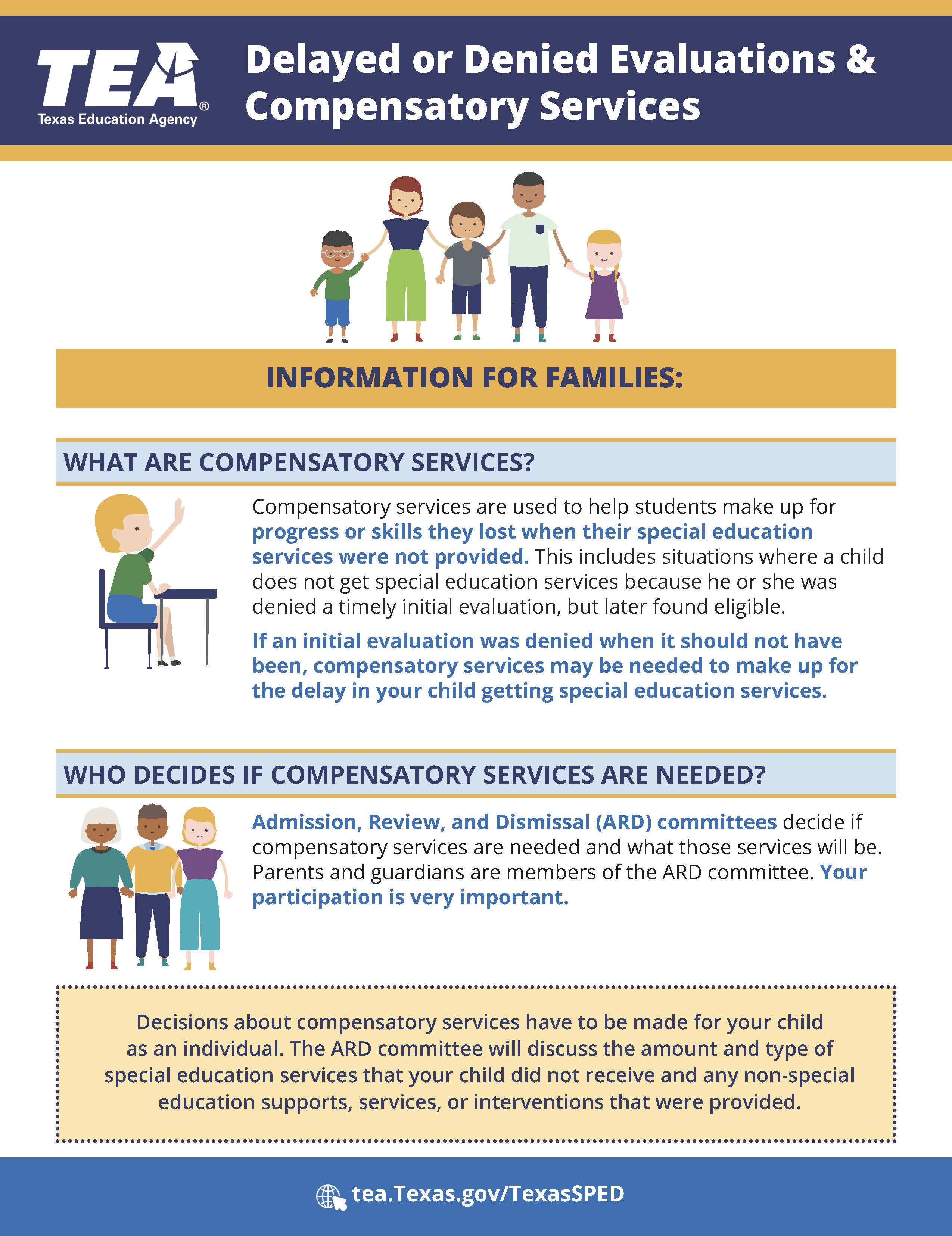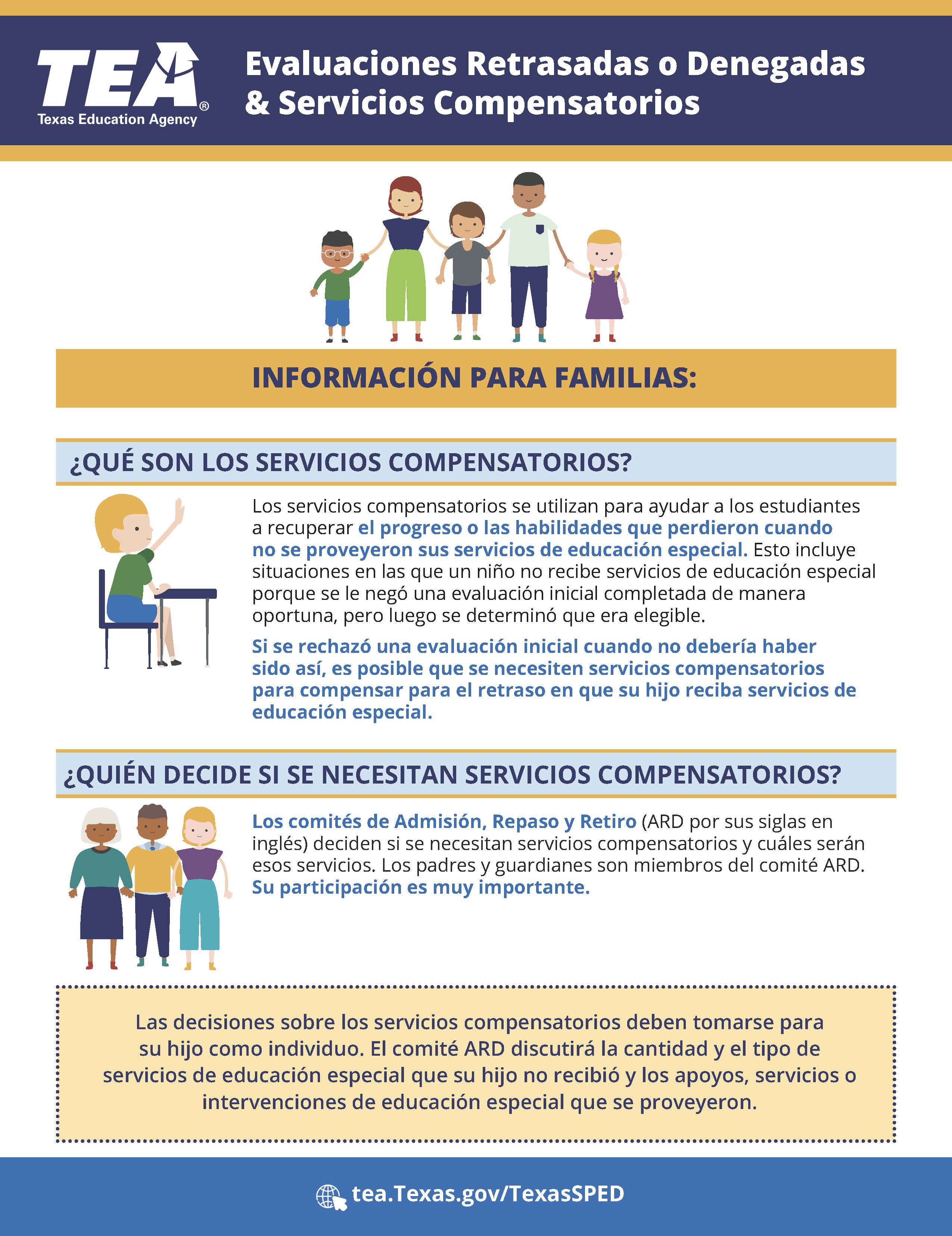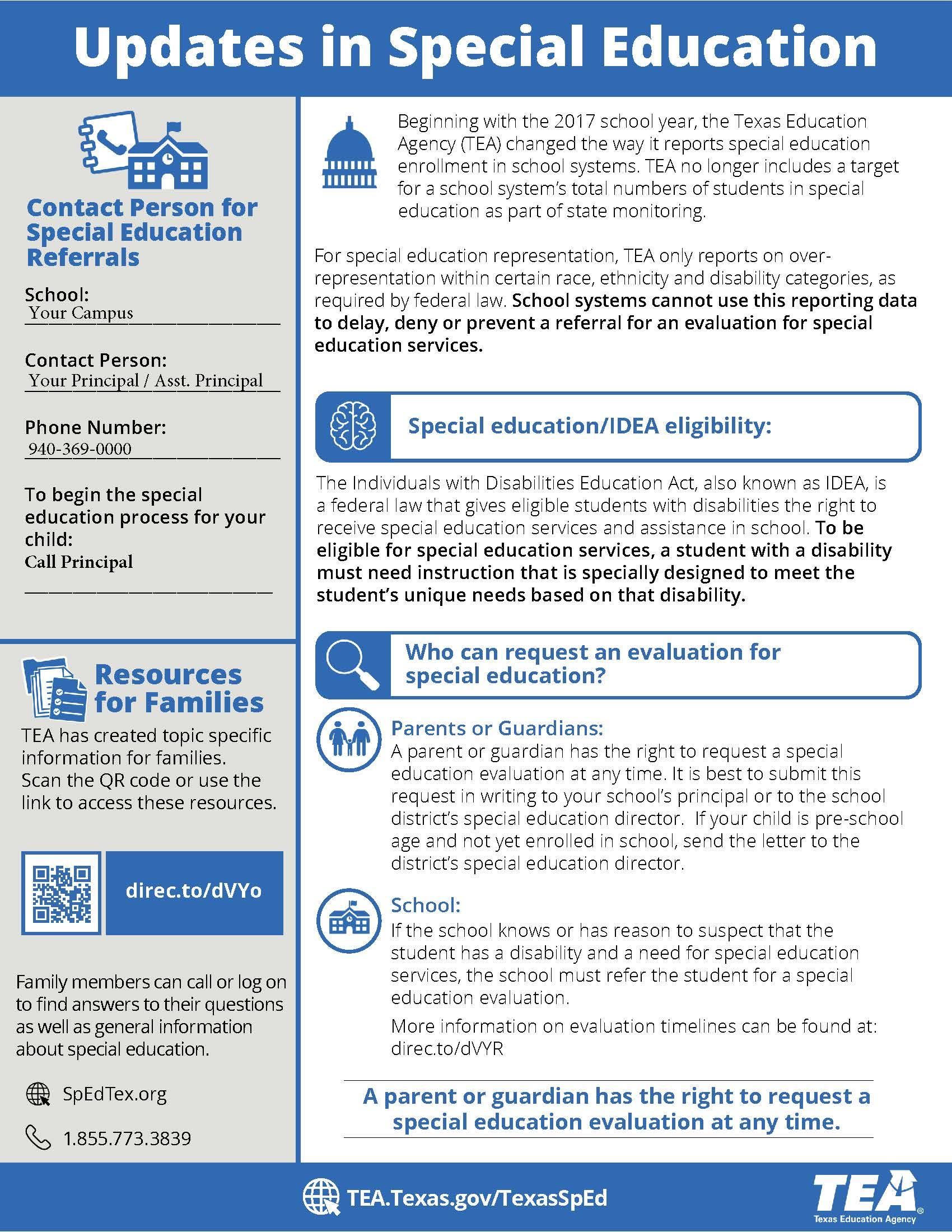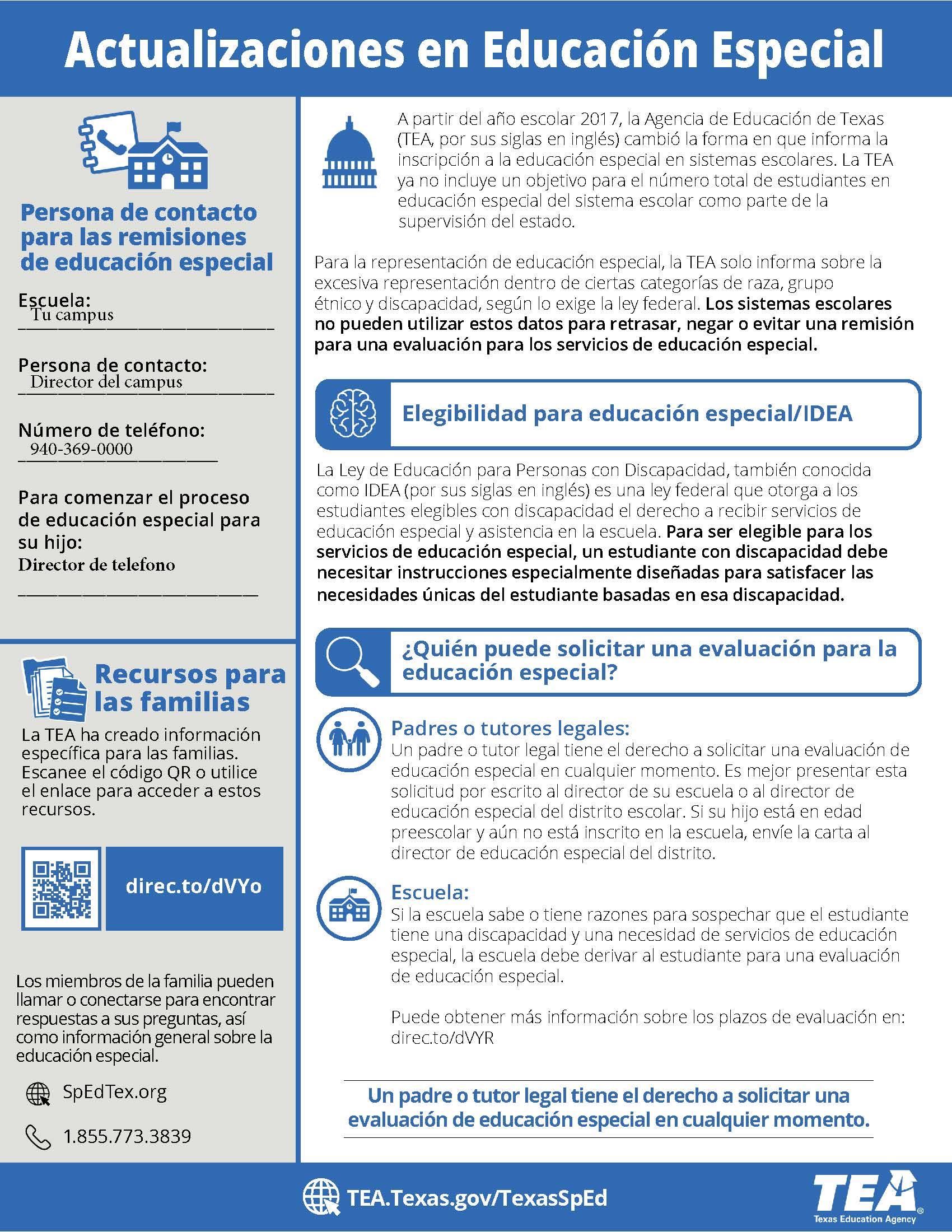Special Education
Page Navigation
Special Education Resources
-
District
Denton ISD Special Education hosts Parent Resource Events on a regularly scheduled basis. These events are specially designed for parent(s)/guardian(s) of special needs children; however, these informational meetings are open to others interested and to the community at large. Snacks and childcare are provided.
Community
City of Denton Adapted Recreation
University Behavioral Health of Denton
Regional
Education Service Center Region 11
State
Special Education Information Center
Parent Resources
-
Web Resources for Parents
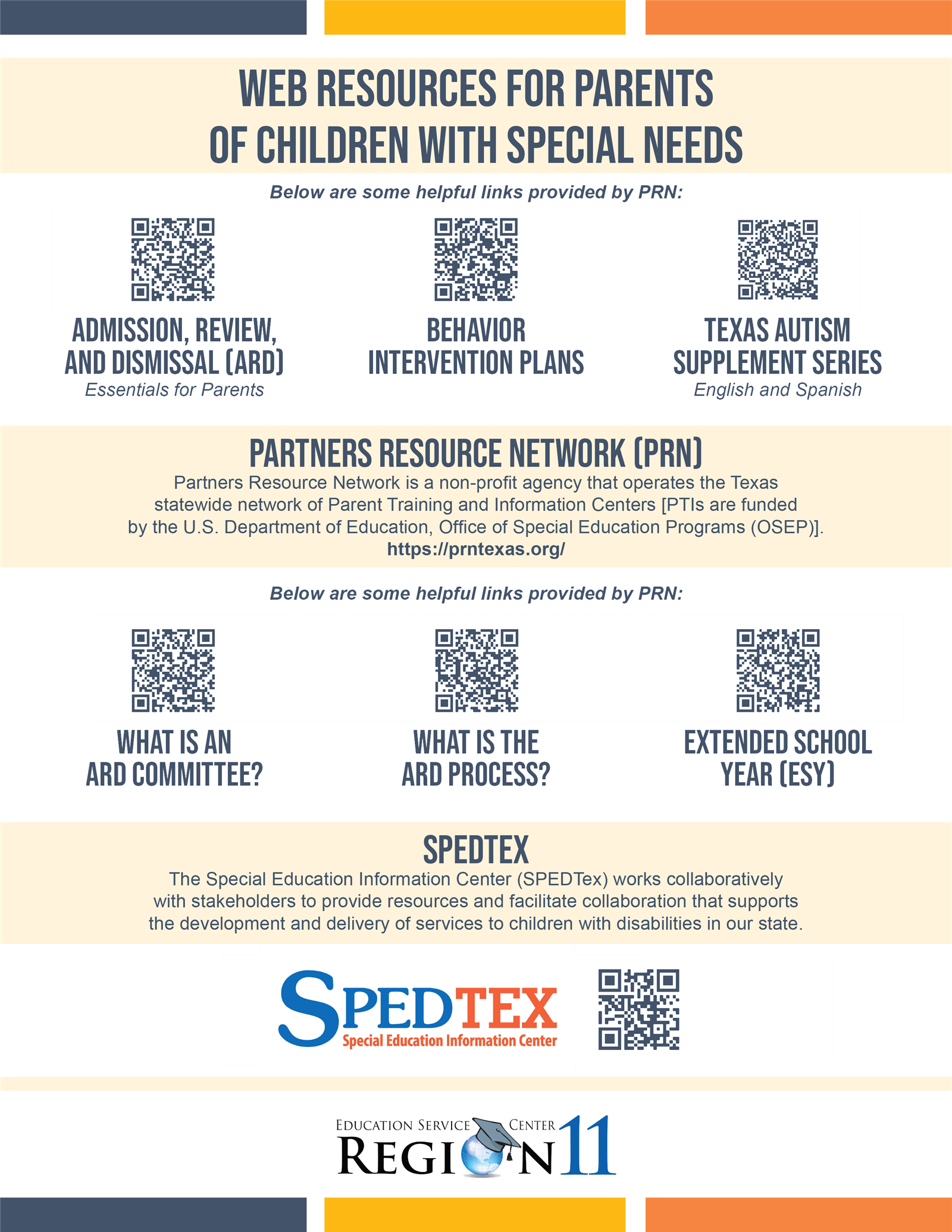
-
Delayed or Denied Evaluations
-
Dyslexia and Related Resources
Texas has a long history of supporting the fundamental skill of reading. This history includes a focus on early identification and intervention for students with dyslexia. This page includes resources to assist in identifying and providing services for students with dyslexia and related disorders in Texas schools. In addition to this page, information is available through the State Dyslexia Coordinator, ESC Dyslexia Network Coordinator, and the dyslexia contacts at each of the 20 regional education service centers and the helpline.
Texas Dyslexia Handbook (2024) (en español)
The Dyslexia Handbook Frequently Asked Questions (FAQs)
For more information, visit the Dyslexia Program Page
-
Helping Your Struggling Learner
Students to Receive Specially Designed Instruction through IEP
For students with disabilities who receive specially designed instruction and who may not be experiencing academic success, the Department of Special Education requires that the Annual Review and Dismissal (ARD) Committee convene to address student progress.
In Denton ISD, each student's Annual Review and Dismissal (ARD) Committee will address any reasonable, necessary interventions. Their goal is to create a plan to guide academic achievement and positive behavior for students who receive services.
This process applies to students attending school face-to-face or ConnectedLearning.
Campuses will reconvene an ARD to design an Individual Education Plan (IEP) under the following conditions:
- The student currently receives specially designed instruction in the subject via an IEP goal;
- The student receives a failing grade in a subject on their report card, and
- The student continues to receive a failing grade in that subject on the next progress report
During the ARD meeting, the committee will review the barriers to success in the identified subject or area. Additionally, the committee will review current services to determine if a change is necessary or if additional, reasonable accommodations are necessary to assist the student in making progress towards the IEP goals and the general curriculum.
For more information, please contact your student's Campus Administrator or the district's Department of Special Education.
-
Supplemental Services for Special Education Students
-
The Texas Education Agency has asked for our assistance in getting the word out regarding a program they are currently offering for select students served by special education in Texas public schools.
Supplemental Special Education Services (SSES) are on-line accounts for eligible parents/caregivers of students with significant and complex disabilities that have been impacted by COVID-19 school closures. Families of students with eligible disabilities can use the on-line accounts to obtain special educational resources and supplies and/or services such as additional speech therapy or other specific services. SSES credits are up to $1,500 per student to be used to supplement what otherwise happens in school to help students continue to make educational progress.
Please see this page at the Texas Education Agency Website for more information:
The SSES program has specific eligibility criteria and is only available to select students. You can apply today using this link: https://tea.texas.gov/academics/special-student-populations/special-education/sses-student-application-process-and-criteria
La Agencia de Educación de Texas ha pedido nuestra ayuda para hacer correr la voz sobre un programa que están ofreciendo actualmente para estudiantes selectos que reciben educación especial en las escuelas públicas de Texas.
Los Servicios Suplementarios de Educación Especial (SSES) son cuentas en la red de internet para padres/cuidadores elegibles de estudiantes con discapacidades significativas y complejas que han sido impactados por el cierre de las escuelas debido al COVID-19. Las familias de estudiantes con discapacidades elegibles pueden usar las cuentas de internet para obtener recursos y útiles y/o servicios como terapia del habla adicional u otros servicios específicos. Los créditos de SSES son hasta $1,500 por estudiante para ser utilizados para complementar lo que sucede en la escuela para ayudar a los estudiantes a continuar con su progreso educativo.
El programa SSES tiene criterios de elegibilidad específicos y solo está disponible para estudiantes seleccionados. Usted puede aplicar hoy usando este enlace: https://tea.texas.gov/academics/special-student-populations/special-education/sses-student-application-process-and-criteria
-
-
Talking Book Program
Students determined, based on dyslexia screening or reading instrument results to have dyslexia or a related disorder, or to be at risk for dyslexia or other reading difficulties, have access to the Talking Book Program (TBP) maintained by the Texas State Library and Archives Commission (TSLAC). Visit the TSLAC website.
The TBP provides students with reading disabilities with the ability to borrow audiobooks free of charge and includes over 100,000 titles, hundreds of which are in Spanish.
For more information, please contact the dyslexia therapist at your school.
(This notice is required by Senate Bill (SB) 2075)
-
Updates in Special Education
Beginning with the 2017 school year, the Texas Education Agency (TEA) changed the way it reports special education enrollment in school systems. TEA no longer includes a target for a school system’s total numbers of students in special education as part of state monitoring. For special education representation, TEA only reports on overrepresentation within certain race, ethnicity and disability categories, as required by federal law. School systems cannot use this reporting data to delay, deny or prevent a referral for an evaluation for special education services. Click the pamphlet below for more information.
A partir del año escolar 2017, la Agencia de Educación de Texas (TEA, por sus siglas en inglés) cambió la forma en que informa la inscripción a la educación especial en sistemas escolares. La TEA ya no incluye un objetivo para el número total de estudiantes en educación especial del sistema escolar como parte de la supervisión del estado. Para obtener más información, haga clic en el folleto a continuación.
-
Audio/Video Recording Request
Audio/Video Recording in Self-Contained Classroom
-
Texas education code §29.022 (i.e. Sb 507) requires school districts to place, operate, and maintain video cameras with audio recording capability in certain self-contained classrooms and other special education settings for students with disabilities, upon the request of a parent, trustee, or staff member, for the purpose of promoting the safety of students with disabilities in these classrooms.
A parent, trustee, or staff member may make a request for installation and operation of video/audio recording of a self-contained classroom or other special education setting by completing and submitting to the campus principal a request for the installation of video and audio recording equipment (“request for installation”) form, including identification of the specific self-contained classroom or other special education setting for which the request is being made. The request for installation form may be obtained from below.
Request for Installation Form in English and Español
A person may notify the district of alleged abuse or neglect occurring in a self‐contained classroom or other special education setting where video/audio surveillance is in effect by completing an incident report form and providing it to the campus principal. The person making the incident report should be as specific as possible regarding the date, time, and location of the suspected abuse or neglect, should include any witnesses, and should describe the suspected abuse or neglect as clearly as possible.
The incident report should be provided to the campus principal as soon as possible but no later than 48 hours after a person submitting the incident report becomes aware of suspected abuse or neglect. If the recording documents an incident as defined by law, the district will release, on request, the recording for viewing by an employee or a parent or guardian of a student who is involved in the incident. Depending on the nature of the recorded incident, the district may also be required by law to release the recording for viewing to individuals described in ehbaf(local), including appropriate personnel or agents of the Department of Family and Protective Services and/or state board for educator certification. For more information, see ehbaf(legal) and (local).
-

